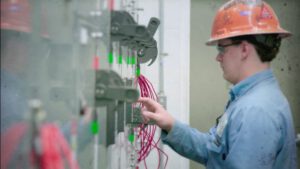Electrician Pasadena installs, repairs, and maintains electrical systems in residential homes and businesses. Some electricians specialize in areas such as solar power and refrigeration.
A career as an electrician can be incredibly rewarding and requires a highly in-demand skill set. Best of all, the training required can be very affordable, so you won’t accumulate the kind of student debt others accumulate on a four-year college track.
Some electricians start their career with only a high school diploma, but most complete a vocational or trade school program that prepares them for an apprenticeship. Those programs may be offered through electrical contractors, the armed forces, or technical colleges. The programs typically combine classroom instruction with hands-on work under the supervision of a seasoned electrician. Some schools also offer an associate degree in electrical engineering or technology. The degree helps students gain more knowledge in the field and can help them later pursue a bachelor’s degree, which will make it easier to obtain employment.
In addition to educational requirements, an electrician must have a strong understanding of how electricity works and how to install and repair electrical wiring and components. This requires a basic understanding of mathematics and the ability to read blueprints, along with the skills to make quick calculations in the field. Electricians often use standard equations to determine how much power is required for specific situations, such as lighting or equipment installations.
An electrician must also be able to identify and repair problems, which requires good critical thinking skills. They must be able to interpret test results and determine the best solutions for their clients. Additionally, they must have the physical stamina to stand or sit for extended periods of time and lift objects on a routine basis. They should also have good vision, as they are frequently on their feet and may need to climb or squat in tight spaces.
Most electricians work on new construction projects, adding wiring and transformers to houses or businesses. However, some electricians specialize in maintaining existing systems by repairing and replacing components. They may also work on electrical generators and solar power installations, which require additional training.
The average electrician works around 8,000 hours to reach the level of a journeyman. This can take up to four years of full-time work, and the requirements vary by state. Some states require electricians to pass an exam to become master electricians, while others only have licensing requirements for apprentices. Many electricians choose to continue their education after obtaining their journeyman status, which can increase their earning potential and allow them to supervise other electricians. NECA offers a number of short courses that provide advanced training in specialized areas of the industry, including solar power, refrigeration, and more.
Training Requirements
The qualifications that an aspiring electrician needs to start working in the field include a high school diploma and some basic training. Many trade and vocational schools offer a career diploma or an Associate of Science (A.S.) degree in electrical technology, but most electricians learn their skills on the job through an apprenticeship program lasting four or five years.
Apprenticeships are available through union-sanctioned programs and through non-union electrical contractors and trade organizations. Apprenticeships require a significant amount of on-the-job training as well as classroom instruction in mathematics, wiring diagrams and schematics, electrical formulas and conversions, motors, and lighting. Electricians also need to understand the National Electrical Code, which lays out standards for electrical safety and reliability.
In addition to the technical skills needed, electricians must possess critical thinking and analytical problem-solving abilities. They need to be able to interpret blueprints and schematics and use a variety of hand and power tools, including drills, pliers, wire strippers, and screwdrivers. The work can be physically demanding, as electricians may need to climb ladders or work in tight spaces, and they often have to stand for long periods of time. The ability to communicate effectively is also important, as electricians must be able to collaborate with other workers and clients.
Electricians must be able to work with the different levels of voltage in electrical systems, including the higher-voltage lines of utility companies and the lower-voltage circuits used inside buildings. They must be able to test the continuity of circuits and wiring using devices such as ohmmeters, voltmeters, and oscilloscopes. They must also be able to prepare sketches and follow blueprints, as well as direct and train other workers in the installation or maintenance of electrical equipment and fixtures.
Some electricians specialize in certain areas of the field, such as linepersons who work on high-voltage utility distribution systems and electricians known as wiremen who work with the low-voltage circuits that run light bulbs, appliances, and communication and fire-alarm systems. In these specialty fields, training is specific and ongoing and involves hands-on field experience, classroom instruction, and continuing education through seminars or professional development courses. NECA Education & Careers offers a number of classes that can help electricians become experts in their niche.
Experience Requirements
Electricians must be able to read and comprehend technical diagrams and electrical blueprints in order to complete specific job tasks. These charts often detail how to connect wiring, where fuses should be located, and other important information. Similarly, they must be able to decipher notes and memos from supervisors and clients in order to understand what is required of them and how to best perform their work.
Electricians also need to be able to evaluate test results from equipment like ohmmeters, voltmeters, and ammeters in order to determine what components need to be replaced or repaired. They must also be able to make decisions when it comes time to choose between installing or repairing an item based on the cost of materials and labor.
Additionally, electricians must have the physical strength and stamina to stand for long periods of time while working with wires and other energized equipment. They must also be able to lift and carry heavy objects on a regular basis, as well as use tools like drills, saws, pliers, and screwdrivers. They must also have the ability to communicate effectively with their customers, supervisors, and other personnel in order to explain what needs to be done or to get permission to access certain areas of a building.
Many states have their own requirements for becoming a licensed electrician. These may include a minimum number of on-the-job training hours or the completion of an apprenticeship program. In some cases, coursework completed at a community college or trade school may be credited toward this requirement.
Once an electrician has obtained their license, they can work on a wide variety of different projects. Depending on their interests and skill sets, they may choose to specialize in one particular area of the field. For example, some electricians focus on residential work, while others prefer to work on commercial or industrial jobs. Others choose to become electrical inspectors or move into project management. Some even start their own businesses and serve as subcontractors for other companies. Those with more advanced degrees can even go on to become electrical engineers.
Job Requirements
Electricians use their knowledge of electrical codes and safety protocols to install, repair, and maintain a wide variety of electrical equipment and wiring. They also diagnose malfunctioning systems, apparatuses, and components by following blueprints and using test devices like ohmmeters and voltmeters.
An electrician may work indoors or outdoors on power and telecommunications lines. The job can be physically demanding, requiring climbing ladders and working in cramped spaces. A high school diploma is usually required for this profession, but some electricians attend vocational or technical schools to earn their certifications. Others gain experience through an apprenticeship that usually lasts for four to five years and includes classroom training, on-the-job experience, and mentorship by master electricians.
In addition to having the proper education, skills, and experience, an electrician must have a valid driver’s license and a clean record. They must be able to communicate well and follow written and verbal instructions. It is important for them to have good math and analytical problem-solving skills. Additionally, they should be able to identify wires by color and have normal color vision, as well as physical strength and flexibility for standing or climbing all day.
Some electricians specialize in specific types of jobs. For example, outside linemen are the electricians you see on television riding boom lifts and repairing telephone or electricity wires. Inside wiremen are the electricians who typically work in apartment complexes, factories, airports, and other commercial buildings.
As a result, each type of electrician has different requirements and responsibilities. Regardless of their specialty, all electricians must be familiar with the National Electric Code and all applicable local, state, and federal regulations.
A well-written electrician job description can save employers a lot of time and money by helping them select the most qualified candidates. In addition, a clearly defined job description can help reduce employee turnover and increase productivity by eliminating miscommunications about expectations. This is particularly important for businesses that hire seasonal and temporary workers, as it can be difficult to find replacements. For more information on how to write a comprehensive job description, visit the National Electrical Contractors Association.

